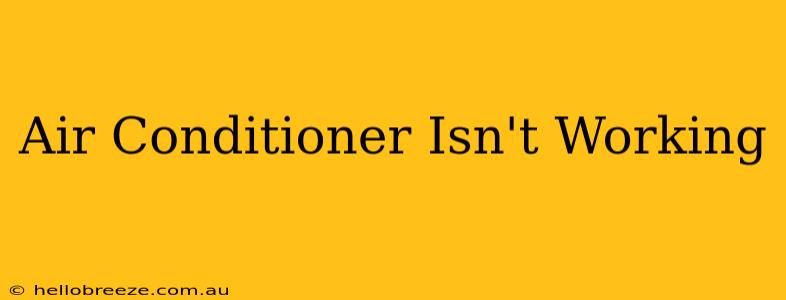Is your air conditioner refusing to cooperate on a scorching hot day? Don't sweat it! This guide will walk you through common reasons why your AC isn't working and offer practical troubleshooting steps to get that cool air flowing again. From simple fixes to when you should call a professional, we've got you covered.
Common Reasons Why Your Air Conditioner Isn't Working
Before you panic and reach for the phone, let's explore some of the most frequent culprits behind a malfunctioning air conditioner. Identifying the problem is the first step towards a swift solution.
1. Power Issues:
- Check the breaker box: A tripped breaker is a common cause. Locate your breaker box and check for any tripped breakers related to your AC unit. Simply reset the breaker by flipping the switch off and then back on.
- Power cord: Ensure the power cord is securely plugged into both the wall outlet and the AC unit. A loose connection can interrupt power flow. Check the outlet itself to ensure it's working by plugging in another appliance.
2. Thermostat Troubles:
- Battery check (for non-smart thermostats): Low batteries in your thermostat can prevent it from functioning correctly. Replace the batteries and see if that resolves the issue.
- Thermostat settings: Verify that your thermostat is set to "cool" and that the temperature is set lower than the current room temperature. Sometimes a simple oversight can be the cause.
- Smart thermostat issues: If you have a smart thermostat, check the connection to your Wi-Fi network and ensure it's functioning properly. Restarting the thermostat may also help.
3. Frozen Evaporator Coil:
- Restricted airflow: A frozen evaporator coil is often caused by restricted airflow. Check for clogged air filters (replace or clean them! This is a crucial step in AC maintenance). Also, inspect the vents and ensure nothing is blocking the airflow.
- Refrigerant leaks: Low refrigerant levels can also cause freezing. This requires professional attention as it's a complex repair.
4. Refrigerant Leaks:
This is a more serious problem. If you suspect a refrigerant leak, don't attempt to fix it yourself. Refrigerant is under high pressure and handling it incorrectly can be dangerous. Call a qualified HVAC technician immediately. Signs of a refrigerant leak can include:
- Weak airflow
- The unit running constantly but not cooling effectively
- Unusual noises from the unit
5. Compressor Problems:
The compressor is the heart of your AC unit. If it's malfunctioning, you'll likely need professional help. Signs of a compressor problem include:
- Loud, unusual noises
- The unit not turning on at all
- Overheating of the unit
When to Call an HVAC Technician
While many minor issues can be addressed with simple troubleshooting, some problems require the expertise of a qualified HVAC technician. Don't hesitate to call a professional if:
- You suspect a refrigerant leak
- The compressor is malfunctioning
- You're uncomfortable performing any of the troubleshooting steps
- The problem persists after trying basic troubleshooting steps
Regular AC maintenance is key to preventing major problems and ensuring your system runs efficiently. Remember to change your air filters regularly and schedule professional maintenance checkups annually. This proactive approach can save you money and keep you cool all summer long!

